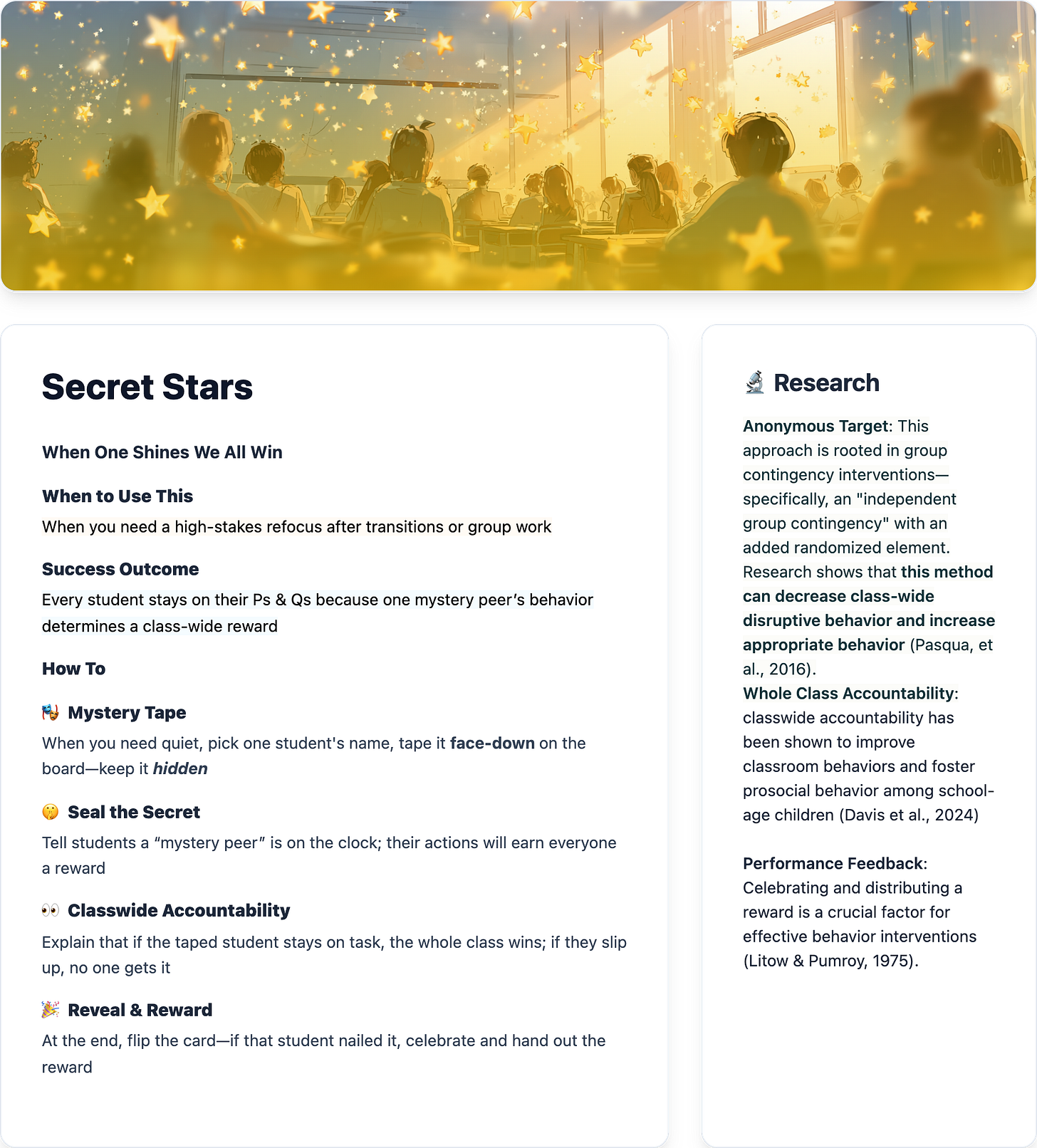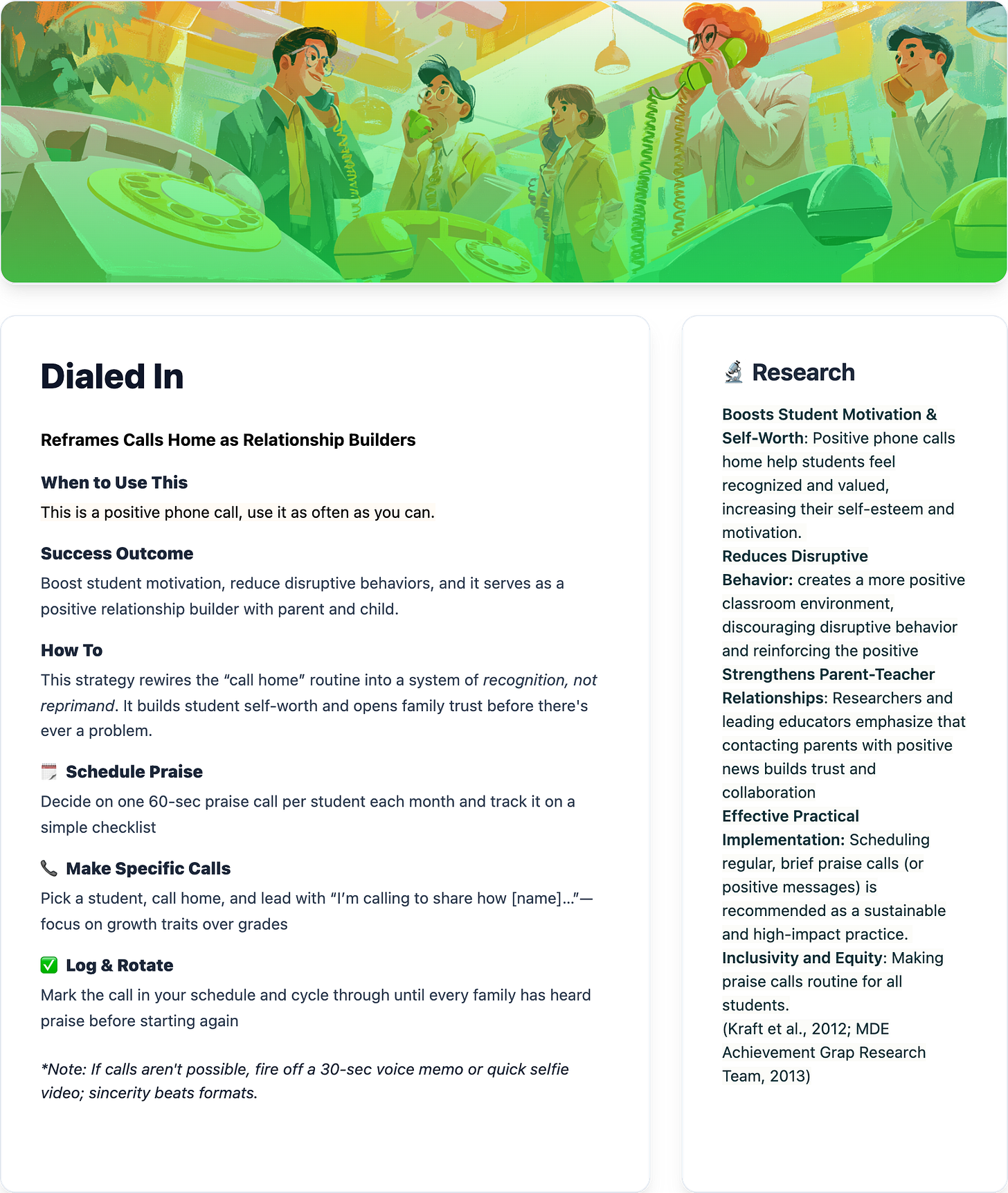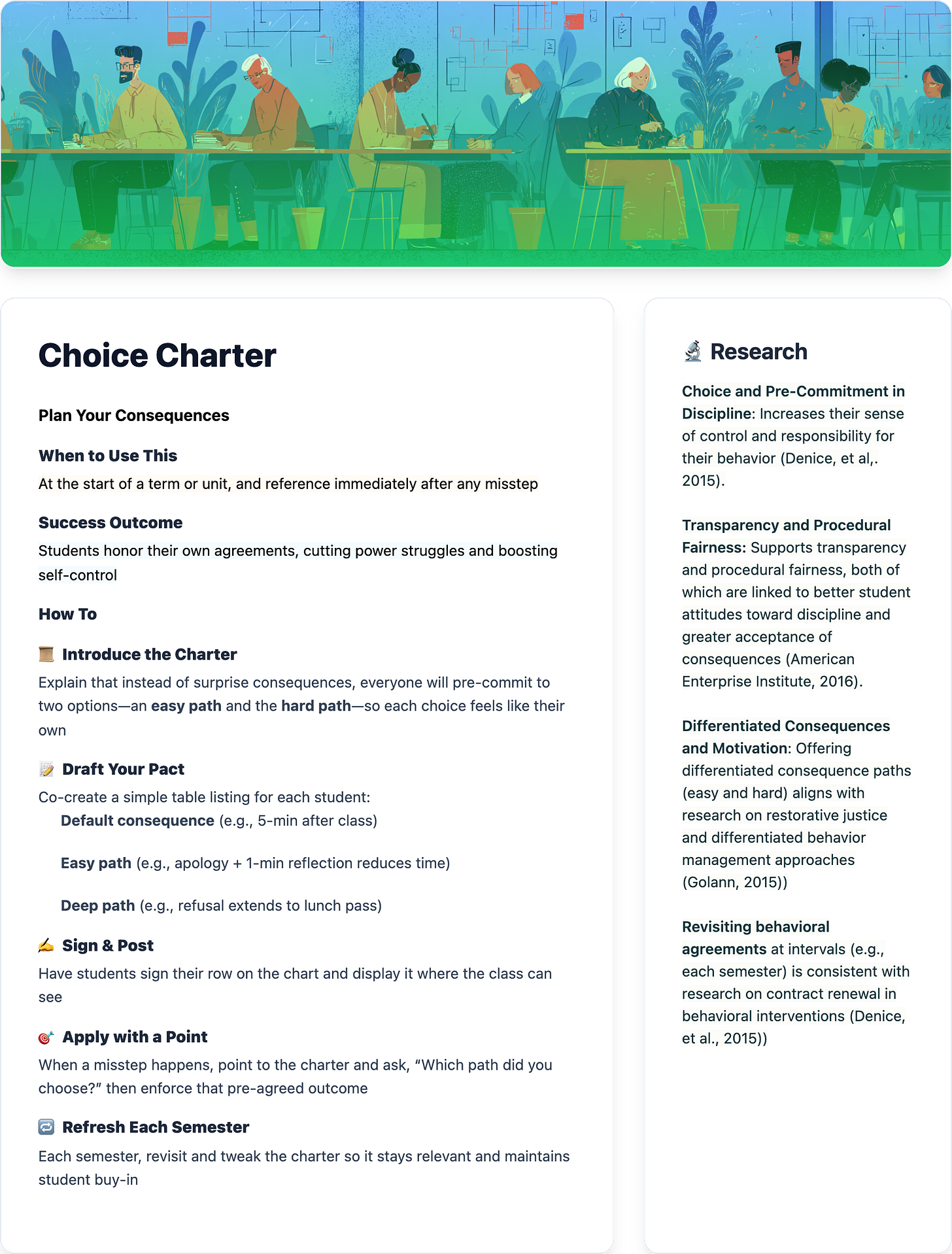3 Student Motivation Strategies That Work in the Classroom
Research-backed moves to boost focus, belonging, and accountability
Classroom Management Strategies That Work
3 Moves to Motivate Positive Student Behavior
Effective classroom management needs fresh, research-backed ideas. Teachers need more than just rules, consequences, and redirections. They need approaches that intrigue and engage today’s students.
In The Carrot and the Stick, we explored how what you notice and how you respond becomes the foundation of your classroom management and shapes the culture students experience each day. In How to Handle Disruptive Students we shared two strategies to prevent student escalation, and in Where Science Meets the Classroom, we added two proactive strategies every teacher should have in their toolbox.
This short article offers three more strategies you can start using tomorrow. Two are designed to bring positive principles to life. The third gives students voice and choice, helping them take ownership when things go off track.
Secret Stars: Whole-Class Motivation Strategy That Builds Focus
Why This Works: Whole-class rewards activate the brain’s reward system, triggering dopamine release. This builds positive peer pressure and strengthens cooperative learning behaviors (Howard-Jones, 2014).
Secret Stars is a simple, research-supported classroom management strategy that boosts on-task behavior while building a strong sense of classroom community. It’s especially effective when you need students to stay focused during independent work or cover a lot of material. Because the identity of the “secret star” is a mystery, students stay engaged and encourage each other to meet expectations, nobody wants to be the reason the class misses out. This gentle peer accountability creates a shared goal and keeps the group motivated.
In BrainZones, this type of sustained focus and independent effort falls within the Yellow Zone, a state that can be challenging for some students to maintain. Secret Stars adds an extra layer of motivation, helping students remain focused and on-task longer, so everyone succeeds together.
Secret Stars taps into the power of whole-class rewards—an approach backed by strong research. A comprehensive meta-analysis found that well-designed classroom reward systems can significantly increase academic engagement and appropriate behavior when tied to clear, specific expectations (SAGE Journals). For teachers, Secret Stars offers a simple, research-supported way to strengthen focus, promote teamwork, and build the Yellow Zone habits that help students thrive!

Dialed In: Positive Calls Home That Boost Motivation
Why This Works: Positive, relationship-focused contact with families builds trust, strengthens home-school connections, and increases student motivation to meet expectations (Sheldon & Jung, 2015).
Dialed In flips the script on the typical “problem calls” home by turning them into powerful classroom management tools for building connection. Instead of reaching out only when there’s an issue, you call to share something positive: “[Name] was excellent today,” “turned in all homework this week,” or “got an A on his test.” This small shift strengthens teacher-family relationships and builds student confidence through recognition and encouragement.
When used consistently, these calls become a powerful motivator—reinforcing effort, creating pride, and extending a positive classroom culture into the home. In BrainZones, this strategy activates the Green Zone, where connection, collaboration, and shared celebration promote engagement and belonging. One quick call can spark a lasting ripple of motivation and trust.
Beyond celebration, positive calls can also serve as a calming support. Research shows that connecting with a trusted caregiver during moments of stress activates social buffering, reducing emotional reactivity and helping students regulate more effectively. When students initiate these calls themselves, it becomes an act of adaptive help-seeking, a self-regulation strategy linked to stronger emotional awareness and resilience.

Choice Charter: Co-Created Classroom Commitments for Accountability
Why This Works: When students help create the rules, they experience a sense of ownership and autonomy, which increases buy-in, accountability, and long-term commitment to positive behavior (Deci & Ryan, 2000).
Choice Charter transforms classroom behavior management by making consequences clear, collaborative, and student-owned. Instead of surprising students with punishments in the moment, you co-create a clear agreement at the start of the term. Students pre-commit to an “easy path” and a “hard path,” making every outcome feel like their own choice. This simple shift reduces power struggles, boosts self-control, and turns behavior management into a shared responsibility rather than a constant tug-of-war.
"If you want to gather honey, don’t kick over the beehive."
— Dale Carnegie
Continuing Your Classroom Management Journey
We hope this Strategy Edition of our Classroom Management Series has sparked your enthusiasm and inspired fresh ideas for keeping students engaged and learning.
“We are what we repeatedly do. Excellence, then, is not an act, but a habit.” — Aristotle
I would love to hear from you. What strategies work best in your classroom? Which areas of behavior management do you want more support with? Your feedback helps shape future articles in this series.
📌 Explore More Classroom Management Strategies:
Add CoreTex Strategy Library with over 200 neuroscience-aligned classroom strategies.
You can also access our full library of proven, brain-based strategies at BrainZones.org and kick your school year off with a plan that works.
With over 30 years in an urban district as both a teacher and an instructional coach, I know how challenging behavior management can be. These strategies make a difference. And if you are still struggling, you are not alone — reach out. We are here to help.
If you find this series valuable, please share it with a colleague and subscribe so you do not miss the next post in the Classroom Management Series.
— Debbie Leonard
Cofounder & Content Creator BrainZones




